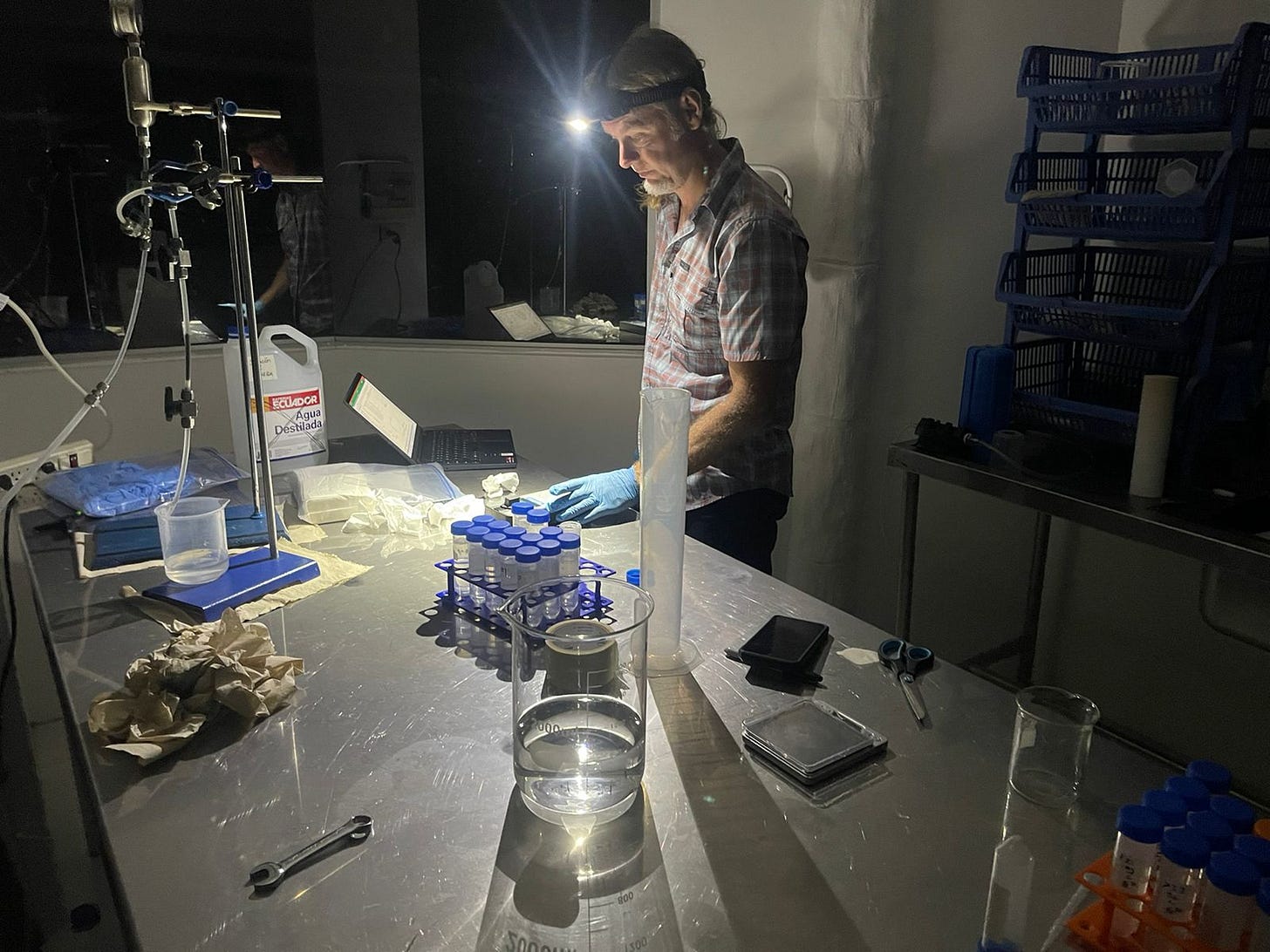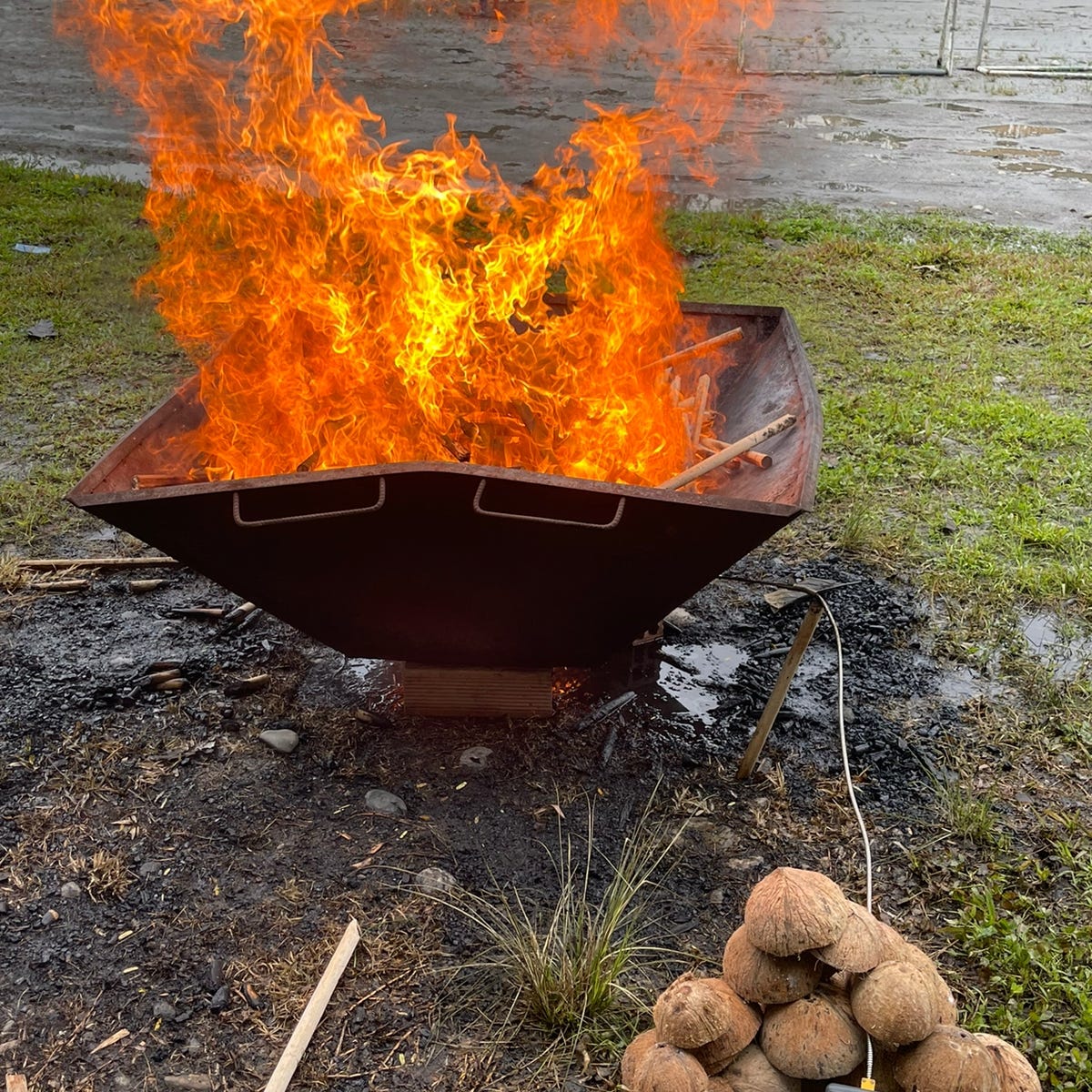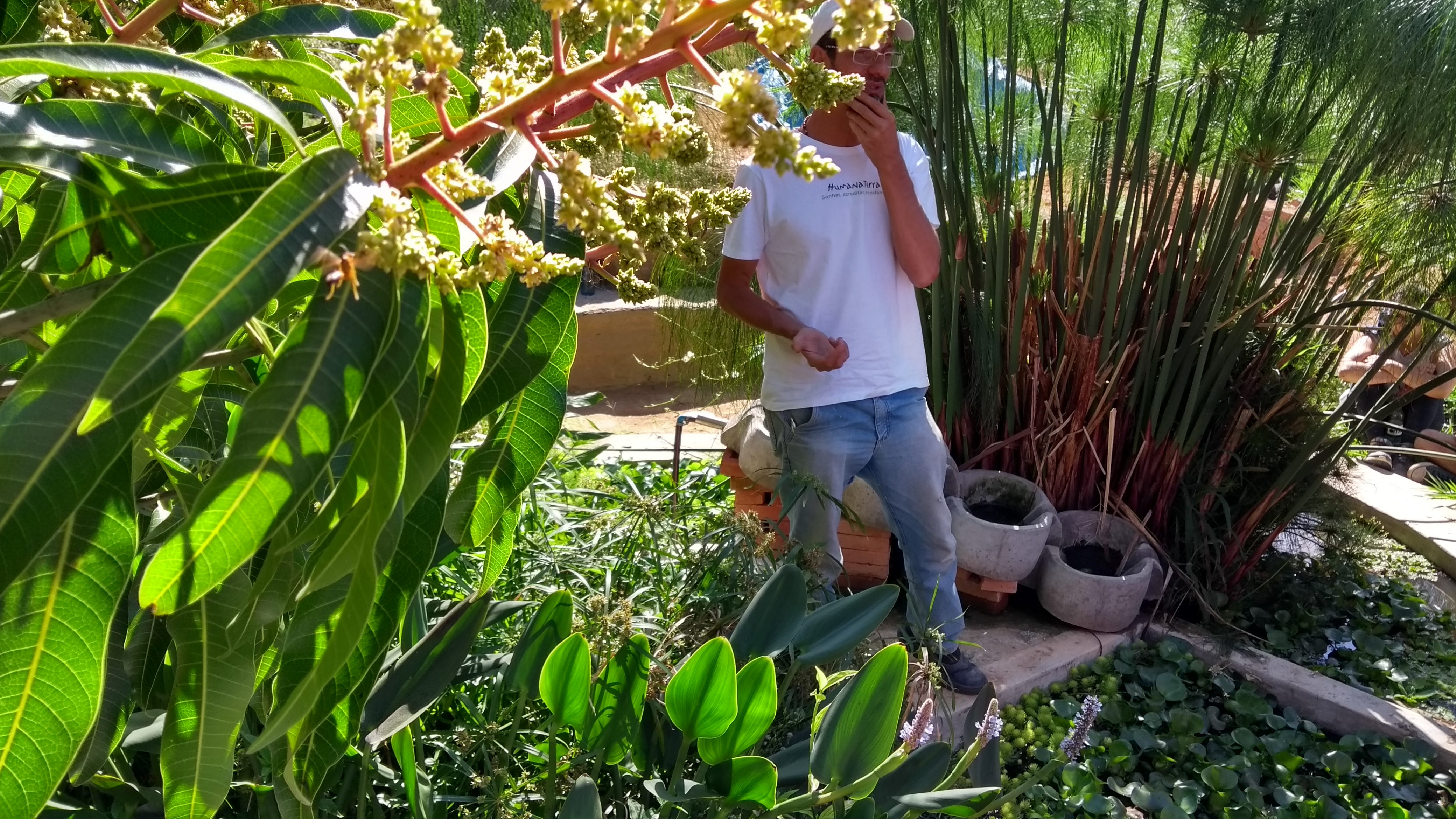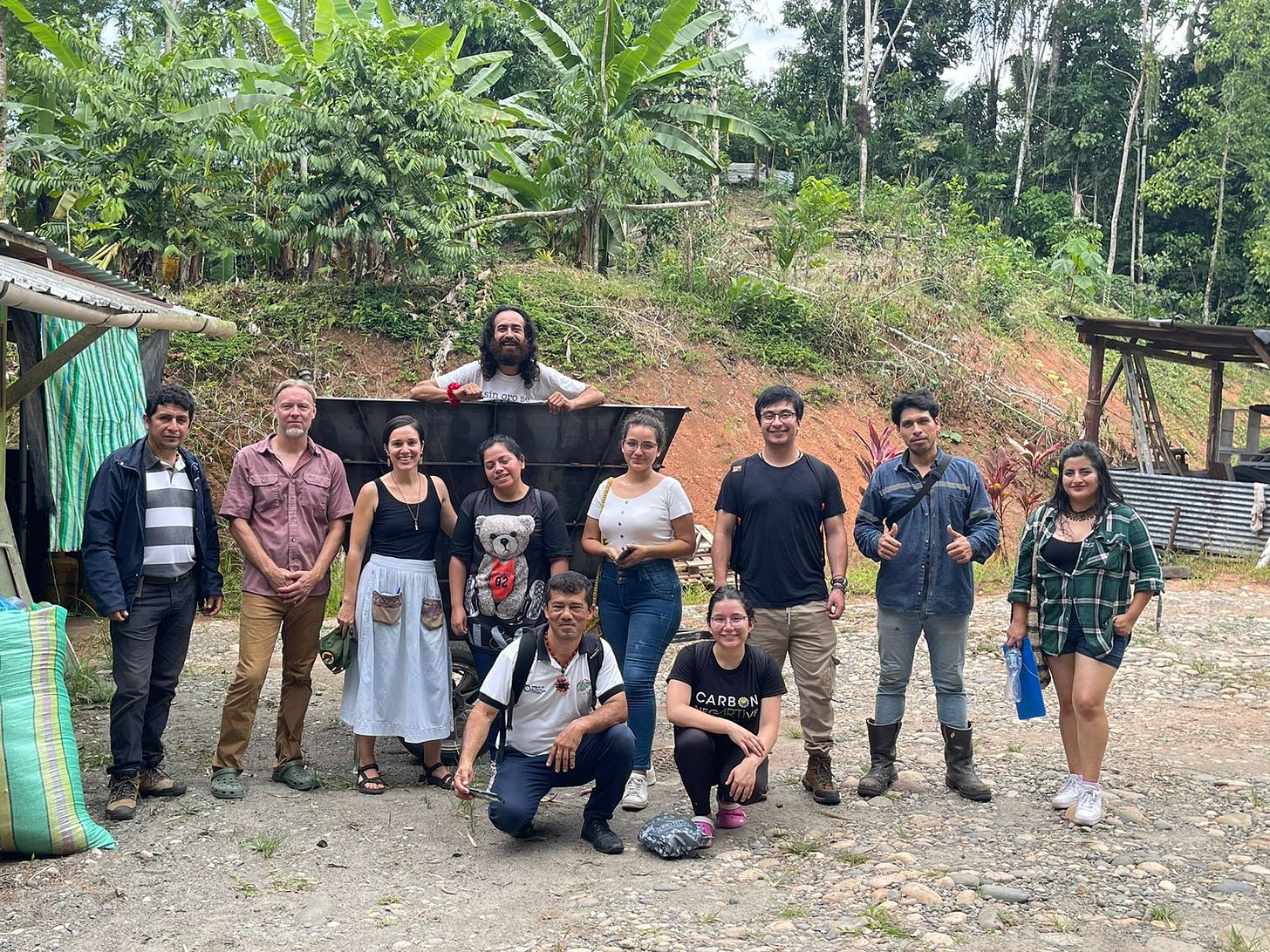Hello again! Long time, no see!
an apology for the lack of posting, and news of what's to come...
I’ve been very remiss about posting updates to this Substack site/newsletter feed. Sorry about that! You have been such steadfast supporters and enthusiasts for our work, and I apologize for the radio silence of the past several weeks.
Attribute it to a personality flaw I’ve never really successfully overcome: I can either “do stuff,” or “write about doing stuff.” However, being productive doing stuff while maintaining a flow of writing about it in detail is something I’ve rarely or maybe never been able to properly achieve.
The past months I/we have been going full-gas on several projects. I keep meaning to “get to a good stopping point” to pull up and write an update, but either things haven’t felt to be at such a point, or something(s) else got in the way.
The photo below kind of sums up what things have frequently been like: middle of the night (in this case, in the dark under a headlamp due to a power outage), in a spartan field lab setting (in this case, in Ecuador), analyzing water samples (while giving thanks for battery powered instruments).
Slowly I have realized that I need to incorporate a new discipline into my regular workflow. A discipline that involves taking regular pauses to reflect on what’s been accomplished and write it up or make a video blog or podcast or produce some other mode of communicating what’s going on. My tendency is to want to have everything “just right,” wrapped up and complete and finished with a bow on top before presenting it to the world. Obviously that just isn’t practical. All of this is a big messy work-in-progress, and if I wait for stages of clearly demarcated “completeness” to present themselves then there will be a lot of waiting and very little writing or communication.
So I am renewing or perhaps making an entirely new type of commitment, to practice a discipline of taking regular “time-outs” from immersion in the continuously swirling slipstream of work and projects to communicate what’s going on – unfinished, unvarnished, warts-and-all. “It is what it is,” as my PhD advisor used to say.
I’m going to start by putting out one to two new items per week. I’ve got a bunch of unfinished stuff I want to share from what we’ve been working on over the last few months. Here’s a list of some of the items that I’ll go into in further detail about in upcoming posts:
New and Improved (!) field lab apparatus and testing methods for rapid small column tests…
On the “New Equipment” side: Paraphrasing comedian Jeff Foxworthy, “You might be a redneck water engineer if you find a vendor for a very specific off-the-shelf liquid metering pump you are really really excited about.” Buy me a beer and ask me about my troubles and I will lament at length about finicky rebuilt and re-rebuilt and re-rebuilt ebay acquired HPLC pumps subjected to the abuses of pushing natural (i.e., seriously contaminated) waters through adsorbent column experiments. Pump expense, and delicateness, and reliability, and bulky unwieldy-ness have been a burr under the saddle of field lab biochar testing for too long! But no more! At the risk of hyperbole, we have found a bomb-proof, smallish (think “no problem fitting in a carry-on”) reliable rock-solid consistent low flow-rate (down to 1 mL/min or a bit below) pump that can handle contaminated and “messy” natural waters – for around $500!!! I kid you not. It’s all true and will be detailed in a forthcoming post.
On the “New Methods” side: We’ve made progress streamlining a “standard column test methodology” that can be extended using mass transfer modeling. The idea is to minimize the amount of time, labor, and experimental resources needed for data collection in a field-lab circumstance (often limiting factors), and maximize the mileage you can get out of those data using modeling simulations. It will take several posts but we’ll be rolling out the new methods over the coming weeks and months and inviting reader feedback on the tools we’re developing. We have important new developments to share regarding the fluoride/bone char sorbent system, as well as the organic micropollutants/dissolved organic matter, biochar adsorbent system.
New and Improved (!) partnerships
We have a new startup initiative with an Austin, TX based company that does food waste and biomass upcycling and resource recovery. The objective of this effort is to produce a variety of tunable char sorbent materials marketable for a range of water and environmental remediation applications. One focus area is bone char sorbents for removal of excessive fluoride in drinking water. But it only gets weirder from there…ask us about “hairchar gardeners’ compost” made from floor sweepings of beauty salons…
Decentralized water treatment resource hubs in Ecuador, Mexico, and Thailand. We are setting up facilities with the technical and logistical expertise for design, outfitting, installation, monitoring, and evaluation of water treatment systems that include sorption processes for removal of chemical water pollutants in low resource settings. We are incubating local small businesses for doing this – this is a new model (for us) that reaches beyond our previous operational models (e.g., the academic research grant-based funding model, and the nonprofit charity donation-based funding model).
New and Improved (!) communications
Spanish language translations: In cases you missed it, we have a whole separate Substack site for the Spanish language version of the biochar water treatment book project:
Tell your Spanish speaking friends and workmates to check it out! This effort is led by our collaborators in Ecuador and all the subscription money goes to their project work.
Ditto for Portuguese! Check out the Portuguese version of the site under development by Guilherme Castagna:
The kids are alright! A couple of young Stanford University undergrads venture out into the world – specifically, Malawi – to implement biochar water treatment and share their experiences candidly in podcast format:
Biochar roundtable with sector experts: I recently recorded a podcast with luminaries in the North American biochar scene to discuss what’s new in the weird wild wonderful world of the biochar business. It will be published later this month.
New environmental consulting service!
We’re building a facility for fabrication, testing, research, and development of a wide variety of environmental technologies. For example, it will house our biochar and water quality field lab development space where we try out new approaches to water treatment and monitoring before deployment. It will be a workshop and maker space for fabrication and prototyping. It will also be a resource hub for conducting hands-on research and carrying out consulting technical service work such as fee-for-service data collection and assistance with writing research grants, project reports, and peer-reviewed publications.
This new entity operates as a technical consulting business. It functions in partnership with Aqueous Solutions (nonprofit organization). All money that goes to Aqueous Solutions (including from paying subscribers to this site) is used for service project work in low-resource communities abroad – buying materials, paying local workers, transporting, feeding and housing project teams, etc. Our aim has always been for Aqueous to operate as lean as possible, with minimal to no overhead. That will not change. The new entity allows us to take on other types of collaborations and fee-for-service projects both domestic and international that expand our reach and capabilities and provides income to employees (like me - woo hoo!). More to come on this new initiative…
I’ve got more items on my mental list to share with you, but this post is already long enough. I’m excited about all we’re doing, and about developing a new discipline to strength my heretofore underutilized muscle for outreach and communication. I’m also excited to avail us of some new Substack features that should make for a more interesting and engaging user experience.
Stay tuned folks! Thanks again for your enduring support and enthusiasm for our work…
Biochar and water quality testing advanced course, Lago Agrio, Ecuador, September 2023.





Hi Josh, very interesting post. Looking farward for the next. If I may ask, do you have direction for low cost biochar activation (such as CO2 using offset gases) for PFAS sorption?